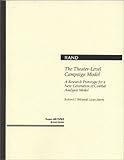The Theater-Level Campaign Model : a research prototype for a new generation of combat analysis model / Richard J. Hillestad, Louis Moore.
Publisher: Santa Monica, CA : RAND, 1996Description: xxii, 179 pages : illustrations ; 28 cmContent type:- text
- computer
- unmediated
- online resource
- volume
- 0833024655 (alk. paper)
- U104 .H527 1996
- Also available on the internet via WWW in PDF format.
 eBooks
eBooks
"Project Air Force -- Arroyo Center."
Includes bibliographical references (p. 175-179).
Many analysts and decisionmakers argue that an order-of-magnitude leap forward in military modeling for the post-Cold War era--particularly campaign modeling--is essential to improve the quality of analyses, training, acquisition, test and evaluation, and innovative thinking. This research has been a step to ensure that the next-generation campaign models will not be mere rewrites of tools currently in use. The authors investigated alternatives to four aspects of modeling they think are essential to improving theater-level campaign analysis: (1) how to create more flexible structures to simulate the wide range of future scenarios and their associated uncertainties; (2) how to link to more detailed models in an analytically valid way; (3) how to represent ground forces maneuvering at the theater campaign level; and (4) how to represent adaptive behavior and aspects of command and control better in this type of model. This research provides insights into some of the alternatives and suggested some promising directions. The authors built the prototype Theater-Level Campaign (TLC) model and used it as a test bed for the different approaches. In many cases, methods were tried and then, finding they were not promising, that code was removed, and research started over in the true spirit of prototyping. The authors believe this type of prototyping and experimentation is critical to the advancement of the state of the art of campaign modeling and analysis. The various sections of the report describe the results associated with each aspect of the experimentation and conclude with more general observations and recommendations for the future.
Also available on the internet via WWW in PDF format.


